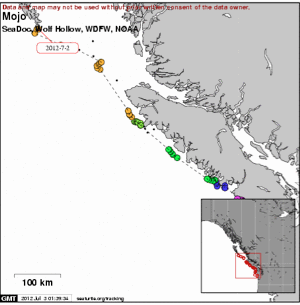Jul 2012
Seal Sitters volunteers reach out at Alki Art Fair
Jul/29/12 07:40 AM
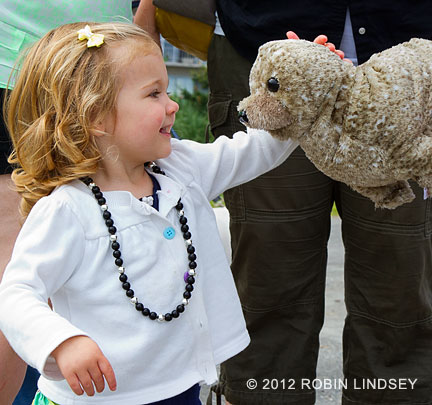
We talked to many parents strolling with their kids, who were captivated (like 2 year old Maggie above) by our seal hand puppet mascot Storm (named in honor of a thin pup we rescued in 2010 who was rehabbed and released successfully back to the wild). Volunteers Julia and Nina, our unparalleled puppeteers, made sure the kids understood that they cannot touch a real seal pup and need to stay far away so the pup can rest undisturbed.
Thanks to Snooter-doots’ Gina for donating two unique felt seals for our raffle this weekend! Yesterday’s winner graciously refused the prize so that we could use the toy to raise additional funds. Thanks so much, Leonard, and to everyone who donated to our cause. Because Seal Sitters MMSN receives no funding from NOAA, the State or City, every contribution helps us pay for our dedicated phone hotline, website and blog hosting and stranding/educational materials. Stop by today for another chance to win these one-of-a-kind toys.
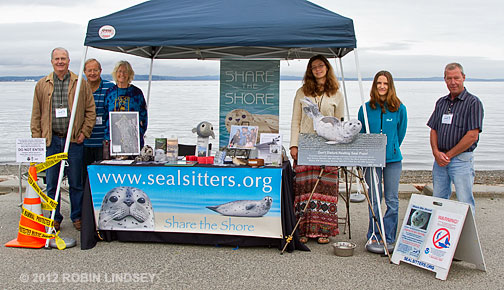
Please swing by our booth today to learn about the marine mammals of Puget Sound and volunteer opportunities.
UPDATE 7/29
Our volunteers talked to 264 great people today. Thanks to everyone who pitched in to make this a very successful event!
Seal Sitters watch over first pup of the season
Jul/23/12 09:55 PM
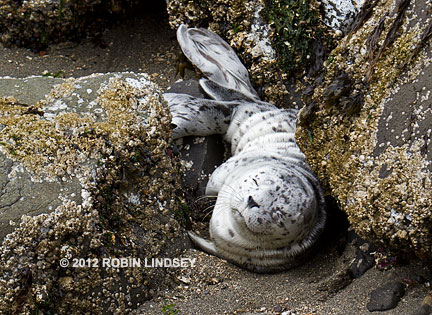
10 year old Bob and his 12 year old sister Mary, visiting from the Los Angeles area, saw the pup and relatives called the NOAA hotline. When asked if he’d like to name him (or her), Bob was thrilled and without hesitation said “Georgie”. Georgie is very much a newborn with the umbilicus still attached and just two very tiny teeth. A pup with no teeth is virtually defenseless from off-leash dogs or people. As a pup gets older, however, he will bite and can transmit disease.
Please be alert as you walk along the beaches. A couple of folks mentioned to our volunteers on duty that they had recently seen pups using the shoreline and beach steps to rest. If you see a pup, please stay far back and call our hotline at 206-905-7325 (SEAL). It is imperative that people and dogs do not impede a pup’s chance to survive - with a 50% mortality rate the first year, pups need to be given space. If people are too close to a nursing pup, the mom may abandon him and he cannot survive on his own. Volunteers watched over Georgie til he swam off around 8pm. We are hoping that mom is out there and will be nursing Georgie tonight. Thanks to a very cooperative public and our dedicated volunteers who put in long hours today protecting him.
Beach cleanup a big success as volunteers honor seal pup Sandy
Jul/22/12 11:19 AM
While the beach did not appear to be as littered as usual on a summer Saturday morning due to a rather rainy Friday, the volunteers filled about 10 large trash bags. They picked up many cans, plastic bottles and caps, countless cigarette butts, and among other things a kayak paddle, a woman's black and pink bra and dirty diapers. Students from UW's Environmental Studies program each donated over 3 hours of their time, picking up bags of trash including spent fireworks on Constellation Beach - fireworks that leave toxic residue and contaminate the Sound. We even had a family drive all the way from Ellensburg, well over 100 miles each way, just to pick up trash on the beach! Brooklyn, the "almost" 9 year old daughter, read about seals on our website, saw the post about Sandy and told her mom and dad (super-parents Vanessa and Kevin) that she wanted to come help seal pups by cleaning up the beach. We can't thank everyone enough for helping out. A total of 128.5 hours were donated yesterday morning. All of these volunteers are a true inspiration and made a difference for our sea life. Special kudos to SS vols David and Eilene Hutchinson and Larry Carpenter.
Find out more about the dangers of marine pollution on Seal Sitters’ website.
Mojo the Steller sea lion pup makes it to Alaska rookeries
Jul/12/12 05:48 AM
Mojo, the Steller sea lion pup who was rescued on Washington’s outer coast, rehabbed at Wolf Hollow in the San Juans, and released back to the wild fitted with a satellite tracking device has made it all the way to the Alaska rookeries. A rookery is where sea lions (or seals) gather in large numbers to give birth, nurse their young and mate. Mojo has travelled 1484 km (over 922 miles) since his release on May 29th. Read all about Mojo here.
PUPDATE 7/23
Mojo continues to cruise northward along Alaska’s shoreline. As of yesterday, the satellite picked up his signal near Sitka. It looks like he is thriving in the wild. Soon, however, we will lose contact with him as he molts his fur and the glued-on tag falls off.
PUPDATE 7/23
Mojo continues to cruise northward along Alaska’s shoreline. As of yesterday, the satellite picked up his signal near Sitka. It looks like he is thriving in the wild. Soon, however, we will lose contact with him as he molts his fur and the glued-on tag falls off.
Alki Beach cleanup in honor of seal pup Sandy
Jul/09/12 05:44 AM
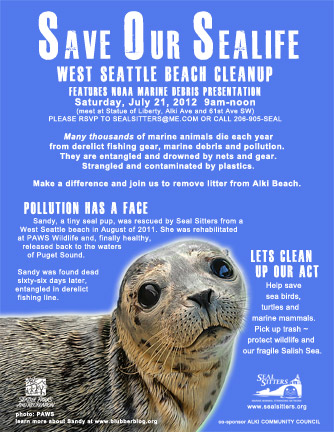
Sandy the seal pup truly puts a face on the dangers of marine pollution and trash. You may also remember the young gray whale that stranded and died on Arroyos Beach - the only contents in his stomach were human trash. Please make a difference and join us. Countless thousands of marine animals die as a result of marine debris, trash and pollution. Trash that is on the beach becomes treacherous in the sea. Read more about marine pollution on Seal Sitters’ website.
Peggy Foreman of NOAA will discuss the dangers of marine debris and pollution shortly after we assemble at 9am. We will meet at the Statue of Liberty (next to the Alki Bathhouse on Alki Beach 61st Ave SW and Alki Avenue SW). Please rsvp for this event as Parks will be providing trash grabbers and buckets for participants.
To print out a copy of this flyer to post at your work or business, please click here. The flyer is a full bleed and may need to be set at “reduce to fit” for some inkjet printers.
July 4th no "blast" for newborn seal pups - or other wildlife
Jul/02/12 05:00 PM
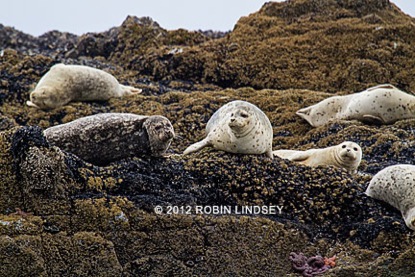
If you find a spot for your picnic on a beach near a harbor seal, please move your picnic to another beach. There are reports of people with blankets and coolers surrounding a lone seal pup - finally calling the stranding network wondering why the mother did not return. A harbor seal mom, shy and wary of humans, will abandon her pup if people and dogs are around! Use common sense and help protect wildlife from harassment.
If you are boating or kayaking, please stay far away from resting harbor seals. In 2010 the network documented a speeding boat intentionally flushing seals from a protected island rookery with a sign posted “closed harbor”. In the photos below, you can see hundreds of seals, including pregnant females and many newborn pups, on the beach. The boat scared the resting seals, flushing them into the water. A female was giving birth right at that very moment and, terrified, she left her newborn pup, still in a bloody birth sac, alone on the deserted beach. The mom had no time to memorize the scent or call of her pup, which often leads to abandonment. Thankfully, a full 20 minutes after the boat left with the people onboard laughing, the mom returned to nurse her pup. More often than not, that pup would have been abandoned and slowly starved to death.
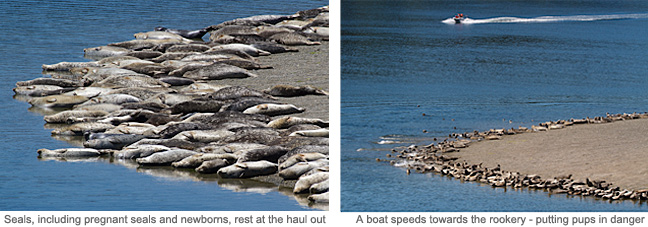
It is not a laughing matter to harass seals. It is a matter of life and death and a violation of federal law, the Marine Mammal Protection Act. This incident was investigated by NOAA’s Office for Law Enforcement. Harassment is not just poking with sticks (yes, we have witnessed that) or scaring an animal back into the water - any change in an animal’s behavior caused by your presence is considered a “take” by law. Many state parks on islands in the San Juans and South Puget Sound have harbor seal rookeries - do not approach animals by boat or by landing nearby. Please, be respectful and move your party elsewhere.
Boat launches and docks can have newborn or weaned pups sleeping on them or nearby, often in danger from propeller strikes or being run over by boat trailers. In some coastal areas, people are allowed to drive vehicles on the beach itself. On July 4th weekend last year, a pup was run over and killed on the beach at Ocean Shores - other animals, sick or weak and unable to move quickly, have been run over on beaches at Westport (California sea lion pup), Long Beach Peninsula (California sea lion), and Twin Harbors (adult harbor seal) at different times of the year. Please report any pup (or adult) that is at a dangerous location or being harassed to your local stranding network.
It goes without saying that fireworks cause pups to be abandoned every year on beaches throughout Puget Sound and the Washington and Oregon coasts. Please be aware of your surroundings and give animals a break this holiday. Celebrate responsibly and you just might save the life of a seal pup - or fawn or baby bird.
Mojo on the move again - sighted in Canada
Jul/01/12 06:37 AM
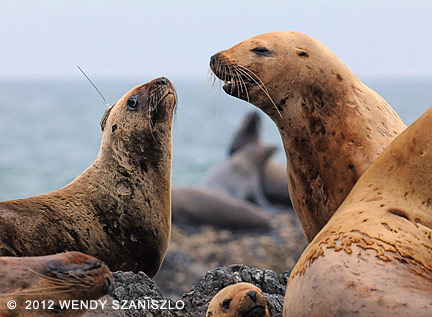
A marine mammal biologist (who also volunteers with the British Columbia Marine Mammal Stranding Response Network) was doing routine re-sights of branded animals when she noticed Mojo with his satellite tag on a very busy and popular Steller haulout site, Long Beach Rocks. This is one of a number of haulouts in and adjacent to the Pacific Rim National Park. Long Beach is considered a year round haulout for Stellers. Biologist Wendy Szaniszlo conducted a 3-yr study of the seasonal abundance and distribution of sea lions in the park preserve. Stellers are considered a Species of Special Concern under Canada’s Species at Risk Act. Wendy reports that Mojo was observed in the “middle of the action”, which means he seems to have adapted well to life back in the wild.
You can follow Mojo’s travels on SeaDoc Society’s website and receive almost daily updates on his location. Since this photo was taken, he is on the move once again and headed further north, well beyond Vancouver Island into Queen Charlotte Sound. As you can see from the photo, this is the time of year when sea lions molt their fur. Soon, Mojo’s glued-on tag will fall off as he sheds his old coat and grows a brand new silky one and transmissions will cease. Many thanks to Wendy for sharing this photo! Read more about Mojo’s story here.
PUPDATE: 7/3/12
A satellite picked up a ping from Mojo’s transmitter yesterday and he has made it to Haida Gwaii (formerly known as the Queen Charlotte Islands), which consists of about 150 islands off the coast of British Columbia. More specifically, his location appears to be Gwaii Hanas National Park Reserve.
Mojo has travelled 962 km (over 598 miles) since released back to the wild on May 29th.
